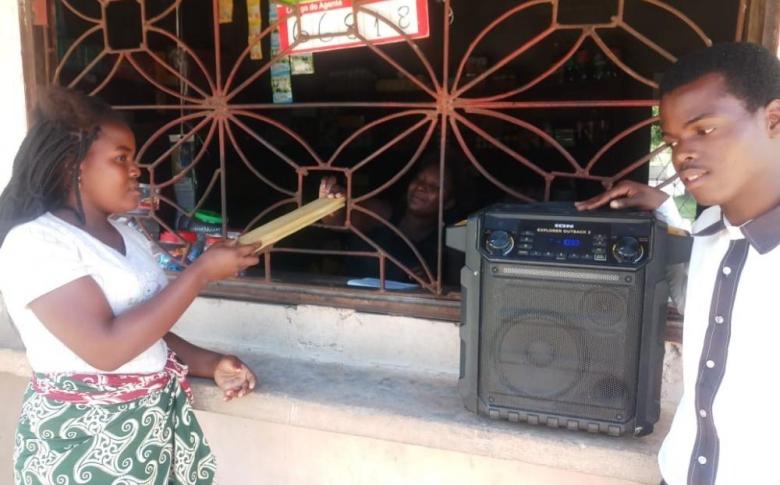Community radio versus the coronavirus in Mozambique

By Suzanne Fenton
In late 2019, nine months after cyclone Idai devastated Mozambique, a network of humanitarian organizations pooling communications services in emergencies — known as the Emergency Telecommunications Cluster (ETC) — rehabilitated six community radios stations.
The stations in Sofala province, the region worst-affected by the cyclone, are the centre of community life — radio is not just used to share news, but to entertain, educate and engage people.
Broadcasters as Radio Gorongosa and Radio Dondo, for instance, are disseminating prevention messages about COVID-19 to communities in the form of advertising spots, radio debates, interviews, reports, drama programmes and even shows specifically produced for children.
“All this means that our mission at this moment is focused on disseminating methods to prevent this pandemic,” says Amelia Salamão, a volunteer at Radio Dondo. “Radio’s main mission is to inform”.
Dondo’s Radio Águia is broadcasting public health advice and songs that advise people on preventive measures to reduce infections within the community in the three local languages of Portuguese, Chindau and Chisena. Director Urbano Gil is once again coming up with great ideas to make sure the community is listening to — and crucially, acting upon — this advice.
“It’s like a game. When people call the studio, we say ‘hello’, but they are not allowed to say ‘hello’ back. They must repeat one way to prevent COVID-19. For example, you must wear a mask, wash your hands well or follow all guidelines. Then they win and can go to a small shop and get a bar of soap as a prize. Soap is very expensive here nowadays, so it helps them,” says Urbano.
This game is played twice a day with volunteers cycling out into the villages with a speaker strapped on an old bike to speak to people and help them claim their prizes.
Over the phone from Dondo, Urbano sounds happily surprised that the idea is working. “In this way, people are memorising how to prevent COVID-19 and this is helping the community to have soap to wash their hands and [create] a hygienic environment for themselves. It has been very exciting as you can see the results,” he says. “People are very involved in this. And for me it’s a pleasure that this new idea we thought might not be possible has become possible.”
Feroza Zacarias, executive director of the National Forum of Community Radios (Forcom) is busy ensuring all radio stations affiliated with the organization at the national level — including those rehabilitated by the ETC — have COVID-19 prevention actions as their top priority. “We are all working as true activists to ensure that communities, especially rural and more remote ones, have information about the coronavirus and are sensitized to adopt all the preventive measures as well as to guarantee the fulfilment of the measures of the state-of-emergency decree.”
For WFP’s Phyza Jameel, the ETC’s Services for Communities Advisor, it’s both a professional and personal triumph. “When we were rehabilitating the community radios, the important thing was that people could listen and get lifesaving advice and information,” says Phyza who spearheaded the project from the ETC’s side. “There was a very strong component of the radio stations ensuring preparedness of communities and we are now seeing the fruits of that.”
With all the radio stations broadcasting the same prevention messages, trust is built up within communities and this means critical information taken on board by listeners. “Now, with this pandemic, these radios have been able to step up really quickly and get information out to people almost immediately, and this is saving lives,” says Phyza from her apartment in Rome where she is in lockdown.
She adds: “Personally, as a humanitarian, we often face a dilemma where we wonder whether [a project] was just a one-off and when you leave an operation, maybe the contribution will be lost or forgotten. In Mozambique, the work the community radios are doing is very encouraging and reinforces the idea that when done properly you can make a real, and sustainable, difference.”